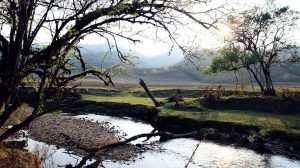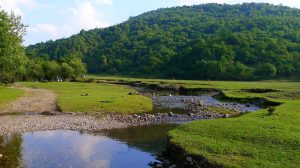Huangcaoba Pasture in Yingjiang County, Dehong

Attractions Overview
Shimiwadi, which means a fairy land in Lisu language, is known as Huangcaoba in Chinese. It is located in Sudian,Yingjiang County. It boasts of natural landscape and ethnic custom. Surrounded by rolling mountains and clear streams, the plain is covered by snow in winter and dotted with flowers in spring, gaining the reputation as “Shangri-la in western Yunnan”.
Chinese Name: 盈江县黄草坝(Pinyin: Yingjiang Xian Huangcaoba)
English Name: Huangcaoba Pasture in Yingjiang County, Dehong
Attraction Type: Pasture
Best Time to Visit: All year around
Recommended Visiting Time: One day
Opening Hours: All day long
Admission Fee: Free
Address: 40 kilometers away from the seat of Yingjiang County, Dehong Prefecture
Why is Huangcaoba Pasture So Special
Shimiwadi – Huangcaoba is located 43 kilometers north of Yingjiang County, with an elevation of about 1,700 meters and an area of about 3.4 square kilometers. There are many meadows in the pasture, cattle and horses are in groups, and a small river passes through them. There are many hundred trees on both sides of the river, and the terrain is gently undulating. The winter climate is cold; hoar-frost is filled with the ground. In spring, the pear flowers are like snow; and there are many flowers around the mountains. In summer, the green grass grows at the height of the knees of people. The clear breeze blows gently, which forms a beautiful and unique alpine grassland scenery. The clear spring water flows quietly in the jungle of ancient trees. The rhododendra in the mountains and plains blossom on the green grass, and the flocks of cattle and sheep are leisurely. What’s more, the rich Lisu style makes people forget to leave. Huangcaoba is known as the “Western Shangri-La”. On the vast grassland, the songs of the happy Lisu people resound between the sky and earth, and the Lisu people are warm and hospitable. At night, the bonfire that ignited, accompanied by singing and dancing, greeted you with enthusiasm. Here is the hometown of the cloud, the source of the fog; here is the place where the colorful clouds are nostalgic; here the grassland is vast; the cattle and sheep are fat; the grass is verdant; the old trees are towering; here there are flowers in spring, shade in summer, fruits in autumn, and snow in winter. It is a paradise on earth – “Shimiwadi”.
Where is Huangcaoba Pasture-Location
Located 40 kilometers away from the seat of Yingjiang County, Dehong Prefecture, Huangcaoba covers an area of about 3 square kilometers and has an elevation of more than 1,000 meters. There are better vegetation, swamps and towering ancient trees in the pasture. The small river flowing through it adds a bit of charm to the entire Huangcaoba Pasture, and is known as Dehong’s “Little Shangri-La”.
How to Get to Huangcaoba Pasture
It is about 40 kilometers of asphalt road from Yingjiang County to Huangcaoba, which takes about 1 hours by car. It is about 170 kilometers from Mangshi to Yingjiang, which takes about 2.5 hours by car.
Features
Shimiwadi, which means a fairy land in Lisu language, is known as Huangcaoba in Chinese. It is located in Sudian,Yingjiang County. It boasts of natural landscape and ethnic custom. Surrounded by rolling mountains and clear streams, the plain is covered by snow in winter and dotted with flowers in spring, gaining the reputation as “Shangri-la in western Yunnan”.

Since ancient times, the family has had the consciousness and tradition of protecting the ecological environment. Therefore, the forest on the mountain has not been damaged and grown densely. A row of cedar trees near the edge of the field is as thick as a bucket, and the torso is smooth and straight, and is ten meters high, becoming a landscape.
Although Huangcaoba Pasture does not have the romance, which as wing lowers grass livestock can’t hide, the vastness of the sky and the earth still makes people stop.
Best Time to Go
It is suitable to visit Huangcaoba Pasture all year round. Every seaon has its own unique beauty.
Nearby Attractions
XiangEhu Lake
Located in the southwest of Jiucheng Town of Yingjiang County, the beautiful XiangEhu Lake is the gateway and business card of Jiucheng Town. There are natural wetlands, sparkling natural lakes, and thousands of acres of lotus ponds with unique charm. XiangEhu Lake has a large amount of water, is not dry all year round, has good water quality, and contains many trace elements needed by the human body. There are more than ten kinds of wild fish in the lake, as well as birds such as egrets, yellow ducks and wild ducks, as well as aquatic plants such as lotus, reed and water hyacinth.
Yunyan Stupa
Yunyan Stupa in Yingjiang County, also known as Manmengding Stupa, is located on the top of Yunyan Mountain, 1 km east of Yingjiang County. “Yunyan” in Dai Language means an auspicious, joyful and fascinating place. It is one of the most important Buddhist pagodas of Hinayana in Yunnan. The pagoda was built in 1947 and it took eight years to complete the work. Although it is a modern product, it is rich in ancient style and is listed as a key cultural relic protection unit in Yunnan Province.

Yingjiang Hornbill Valley
The forest coverage rate in Yingjiang County is 73.9%. There are many kinds of birds living here. At present, there are 550 species of birds found and recorded in Yingjiang, accounting for more than one-third of the national birds. The unique and precious Buceros bicornis, anthracoceros coronatus and Rhyticeros undulatus settle here. Therefore, it has the reputation of “Chinese Hornbill Valley”. Yingjiang is a beautiful and magical place, a paradise for birds, a kingdom of flora and fauna.
Travel Tips
- Accommodation: At present, there is no reception capacity in the scenic spot, you can choose to stay in the county seat, where the hotels are at the price of about 100 to 300 yuan. What’s more, you can choose to stay at the Sudian Township Government at the price of 100-200 yuan, which is 10 kilometers away from Huangcaoba. For those camping lovers, they can choose to make camp in the field.
- Food: Visitors can go to the seat of Sudian Township Government, which is 10 km away from Huangcaoba, and eat local alpine beef, fish, wild vegetables, etc., and feel the Lisu style.
- Attractions: The main scenic spots are meadows, rivers, and ancient trees, and the cattle and horses and the surrounding primeval forests. The scenery of the four seasons varies from season to season. In spring and summer, the grass is verdant. In autumn, the yellow grass is spectacular. In winter, the winter frost is picturesque. The pear flowers blossom in April, which is constituted of a beautiful scenery with the trees around Huangcanba.

 7 Days GolfingTour
7 Days GolfingTour
 8 Days Group Tour
8 Days Group Tour
 8 Days Yunnan Tour
8 Days Yunnan Tour
 7 Days Shangri La Hiking
7 Days Shangri La Hiking
 11 Days Yunnan Tour
11 Days Yunnan Tour
 6 Days Yuanyang Terraces
6 Days Yuanyang Terraces
 11 Days Yunnan Tour
11 Days Yunnan Tour
 8 Days South Yunnan
8 Days South Yunnan
 7 Days Tea Tour
7 Days Tea Tour
 8 Days Muslim Tour
8 Days Muslim Tour
 12 Days Self-Driving
12 Days Self-Driving
 4 Days Haba Climbing
4 Days Haba Climbing
 Tiger Leaping Gorge
Tiger Leaping Gorge
 Stone Forest
Stone Forest
 Yunnan-Tibet
Yunnan-Tibet
 Hani Rice Terraces
Hani Rice Terraces
 Kunming
Kunming
 Lijiang
Lijiang
 Shangri-la
Shangri-la
 Dali
Dali
 XishuangBanna
XishuangBanna
 Honghe
Honghe
 Kunming
Kunming
 Lijiang
Lijiang
 Shangri-la
Shangri-la
 Yuanyang Rice Terraces
Yuanyang Rice Terraces
 Nujiang
Nujiang
 XishuangBanna
XishuangBanna
 Spring City Golf
Spring City Golf
 Snow Mountain Golf
Snow Mountain Golf
 Stone Mountain Golf
Stone Mountain Golf












